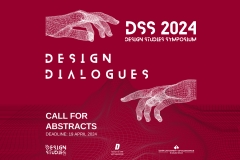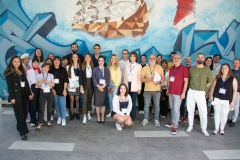
GRADUATE SCHOOL
Ph.D. In Design Studies
FFD 654 | Course Introduction and Application Information
| Course Name |
Representation, Body and Politics
|
|
Code
|
Semester
|
Theory
(hour/week) |
Application/Lab
(hour/week) |
Local Credits
|
ECTS
|
|
FFD 654
|
Fall/Spring
|
3
|
0
|
3
|
7.5
|
| Prerequisites |
None
|
|||||
| Course Language |
English
|
|||||
| Course Type |
Elective
|
|||||
| Course Level |
Third Cycle
|
|||||
| Mode of Delivery | - | |||||
| Teaching Methods and Techniques of the Course | - | |||||
| Course Coordinator | ||||||
| Course Lecturer(s) | - | |||||
| Assistant(s) | - | |||||
| Course Objectives | The aim of the course is to bring the concept of the body problematized in social sciences and humanities to the attention of graduate students in art and design. |
| Learning Outcomes |
The students who succeeded in this course;
|
| Course Description | The body has become an interdisciplinary field of inquiry in the last couple of decades. In this course, we will examine theoretical work that identify and problematize the ways our physical bodies are shaped by social, political and technological forces. The role of design is particularly significant in both empowering and regulating subjects with respect to their embodied experiences. In our technoculture of design, the body increasingly becomes the site for representation and political debate. The course is structured in weekly topics that address body in different contexts, both theoretical and lived. |
|
|
Core Courses | |
| Major Area Courses |
X
|
|
| Supportive Courses | ||
| Media and Management Skills Courses | ||
| Transferable Skill Courses |
WEEKLY SUBJECTS AND RELATED PREPARATION STUDIES
| Week | Subjects | Related Preparation |
| 1 | Introduction to the Course | None |
| 2 | The Social Body 1 | Sue Scott and David Morgan (eds) – excerpts from “Body Matters” Nick Crossley – excerpts from “The Social Body: Habit, Identity, Desire” |
| 3 | The Social Body 2 | Pierre Bourdieu - excerpts from “Chapter 3: The Habitus and the Space of Lifestyles” |
| 4 | The Sexual and Gendered Body | Kathryn H. Anthony – excerpts from “Defined by Design: The Surprising Power of Hidden Gender, Age and Body Bias in Everyday Products and Places” Nick Crossley – “Consumption, Gender, and the Fashion-Beauty Complex” Judith Butler – excerpts from “Bodies That Matter: On the Discursive Limits of ‘Sex’” Alison Phipps – excerpts from “The Politics of the Body: Gender in a Neoliberal and Neoconservative Age” |
| 5 | Addressing the Body: Discourses of Dress | Joanne Entwistle – “The Dressed Body” from Body Dressing edited by Joanne Entwistle and Elizabeth Wilson |
| 6 | Body Modifications | Paul Sweetman- Anchoring the ( Postmodern) Self? Body Modification, Fashion and Identity/ Bodies of Change: A Comparative Analysis of Media Representations of Body Modification Practices Author(s): Josh Adams |
| 7 | The Technological Body, The Modified Body | Donna Haraway – “A Cyborg Manifesto: Science, Technology, and Socialist-Feminism in the Late Twentieth Century” Scott Bukatman – “Replicants and Mental Life” Victoria L. Pitts – excerpts from “In the Flesh: The Cultural Politics of Body Modification” |
| 8 | Body and Power | Judith Butler – “Bodies and Power, Revisited” Michel Foucault – Excerpts from “Discipline and Punish”, “Technologies of the Self” and “The Birth of Biopolitics” |
| 9 | Sculpting Perfection: Women and Bodybuilding | Anne Balsamo – “ Feminist Bodybuilding” Excerpts from “ Women, Sport and Culture, watching Pumping Iron II |
| 10 | Supernatural Bodies: Display of Gender in the Superheroes’ Literature | Friedrich Weltzien – “Masque-ulinites: Changing Dress as a Display of Masculinity in the Superhero Genre |
| 11 | The Political Body | Gilles Deleuze & Felix Guattari – “Desiring Machines and Body Without Organs” Daniel Smith – “What is the Body Without Organs? Machine and Organism in Deleuze and Guattari” Giorgio Agamben – Excerpts from “Homo Sacer” and “The Use of Bodies” Alphonso Lingis – “The Society of Dismembered Body Parts” |
| 12 | The Virtual Body | Katherine Hayles – excerpts from “How We Became Posthuman: Virtual Bodies in Cybernetics, Literature, and Informatics” – (audiotape cf) Scott Bukatman – excerpts from “Terminal Identity: The Virtual Subject in Post-Modern Science Fiction” |
| 13 | Queer Bodies | Guest speaker |
| 14 | Body and Space | Jane Rendell, Introduction: Gender, and Architectrure, excerpts from Gender Space Architecture: An Interdisciplinary Introduction. |
| 15 | Review Week | |
| 16 | Final Submissions and Meeting |
| Course Notes/Textbooks |
|
| Suggested Readings/Materials |
EVALUATION SYSTEM
| Semester Activities | Number | Weigthing |
| Participation |
1
|
10
|
| Laboratory / Application | ||
| Field Work | ||
| Quizzes / Studio Critiques | ||
| Portfolio | ||
| Homework / Assignments |
4
|
20
|
| Presentation / Jury |
1
|
30
|
| Project | ||
| Seminar / Workshop | ||
| Oral Exams | ||
| Midterm | ||
| Final Exam |
1
|
40
|
| Total |
| Weighting of Semester Activities on the Final Grade |
100
|
|
| Weighting of End-of-Semester Activities on the Final Grade | ||
| Total |
ECTS / WORKLOAD TABLE
| Semester Activities | Number | Duration (Hours) | Workload |
|---|---|---|---|
| Theoretical Course Hours (Including exam week: 16 x total hours) |
16
|
3
|
48
|
| Laboratory / Application Hours (Including exam week: '.16.' x total hours) |
16
|
0
|
|
| Study Hours Out of Class |
16
|
8
|
128
|
| Field Work |
0
|
||
| Quizzes / Studio Critiques |
0
|
||
| Portfolio |
0
|
||
| Homework / Assignments |
4
|
4
|
16
|
| Presentation / Jury |
1
|
10
|
10
|
| Project |
0
|
||
| Seminar / Workshop |
0
|
||
| Oral Exam |
0
|
||
| Midterms |
0
|
||
| Final Exam |
1
|
20
|
20
|
| Total |
222
|
COURSE LEARNING OUTCOMES AND PROGRAM QUALIFICATIONS RELATIONSHIP
|
#
|
Program Competencies/Outcomes |
* Contribution Level
|
||||
|
1
|
2
|
3
|
4
|
5
|
||
| 1 | to be able to develop scientific expertise and capabilities in the field of design studies by using creative and critical thinking as well as research skills; innovatively contributing to the discipline through new ideas, |
X | ||||
| 2 | to be able to comprehend the interaction across various disciplines related to the field of design reaching at original conclusions via using new and complex analysis, synthesis and evaluation skills, |
X | ||||
| 3 | to be able to develop new strategic approaches to solve unforeseen complex issues in design practice through integrative and creative elaboration, |
X | ||||
| 4 | to be able to conduct independent research, analyze scientific phenomena through a broad, deep and critical perspective, arrive at new syntheses and evaluations in design discipline, |
X | ||||
| 5 | to be able to publish scientific articles in reputable refereed journals, present papers in scientific conferences in the field of design and its sub-disciplines, |
X | ||||
| 6 | to be able to develop effective communication skills to scientifically present and defend original ideas to an expert audience, |
X | ||||
| 7 | to be able to conduct affective team work in the field of design, |
X | ||||
| 8 | to be able to use the English language fluently for both comprehending scientific publications and developing proper communication with foreign colleagues, |
X | ||||
| 9 | to be able to contribute to the process of transforming into an " information society", by following the technological, social and cultural developments on both academic and professional grounds continuously, |
X | ||||
| 10 | to be able to develop skills of designing and producing unique models and products that will be certificated as registered design, trade mark and patents. |
X | ||||
*1 Lowest, 2 Low, 3 Average, 4 High, 5 Highest
NEWS |ALL NEWS

DSS 2024 CALL FOR PAPERS | THEME: DESIGN DIALOGUES
DSS 2024 CALL FOR PAPERS THEME: DESIGN DIALOGUES The Design Studies Graduate Program and the Faculty of Fine Arts and Design at the Izmir

Design Studies Symposium 2023: Realities & Frontiers
The Design Studies Symposium 2023 (DSS 2023) organized by the IEU Graduate School Design Studies programs was held on 1-2 June, at




